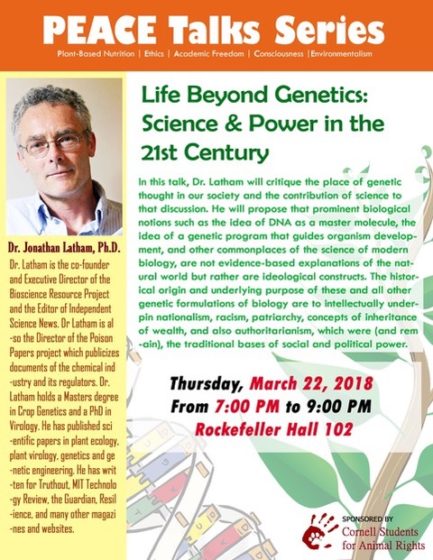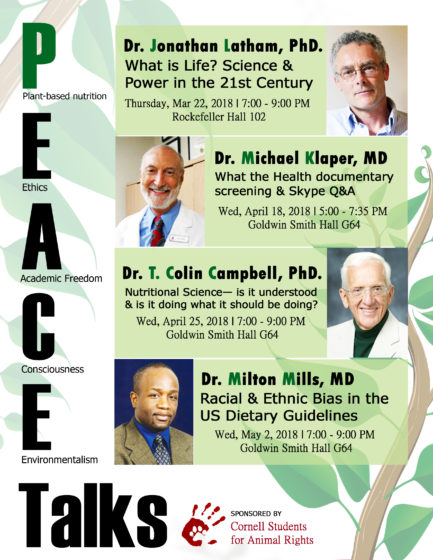“Our mission is to provide the highest quality scientific information and analysis to enable a healthy food system and a healthy world”
The Bioscience Resource Project provides scientific and intellectual resources for a healthy future. It publishes Independent Science News, a media service devoted to food and agriculture, and their impacts on health and the environment. It also offers resources for scientists and educators and internships and training for students. Through its innovative scientific journalism and original biosafety review articles, the project provides unique and revealing perspectives on issues that are fundamental to the survival of people and the planet. The project does not accept advertising or corporate funding and is a non-profit 501(c)3 organization. It is completely dependent on individual donations.We invite you to join the Project as a contributor or a donor.
Bioscience Resource Project News and Views
Jonathan Latham interviewed by Derrick Jensen and Peter B. Collins
Listen to these new talks and interviews and visit our Radio and BSR Video pages for more: https://bioscienceresource.org/publications/
The Project’s scientists are available to discuss science, food and agriculture and their impacts on health and the environment. Contact us to arrange an interview or talk. Below are some recent radio interviews with Jonathan Latham, PhD about the Poison Papers and a talk on GMOs given to the Sierra club.
Derrick Jensen interviews Jonathan Latham on Resistance Radio about the Poison Papers
Scientific innovation and public protection depends on regulation. Regulation at government agencies such as the EPA has an undeserved aura of science and rigour that is exposed in this fascinating extended (51 minute) interview. https://resistanceradioprn.podbean.com/e/resistance-radio-jonathan-r-latham-061718/
Jonathan Latham interviewed about the Poison Papers by Peter B. Collins June 2017
Based on the newly-released Poison Papers, Dr. Jonathan Latham of Independent Science News slams the EPA and its predecessors. Latham is also executive director of the Bioscience Resource Project, which has released a huge trove of documents from industries and regulators, the Poison Papers here.
We open with a discussion of recent moves by Trump’s EPA under Scott Pruitt, which just announced very narrow enforcement of 2016’s updates of the Toxic Substances Control Act of 1976. Latham is dismissive, saying the EPA “already had its agenda for not doing anything”, and that EPA “has never done its job”.
This leads to his description of the Poison Papers, which date to 1920 and show that pattern of weak regulation, unchanged by the creation of the Environmental Protection Agency in 1970. We walk through searches for “Agent Orange” and “glyphosate”, and he comments on the range of documents in the collection.
Latham offers a sweeping indictment of EPA and regulation of toxic chemicals in general, describing a game where the industries are always outraged at “over-reach” and EPA enables the industries while appearing to regulate them. He sees little difference between Democrats who champion science as the basis of regulation and Republicans who promote corporate profits over sensible regulation. https://www.peterbcollins.com/2018/06/11/in-depth-interview-dr-jonathan-latham-exposes-the-game-epa-plays-with-industries-it-regulates/
GMO Hazards to Health and Ecosystems
This video presents an overview of GMOs. How they are made, how that impacts on their safety, and it details some of the specific documented concerns we have. Filmed at the Sierra Club of Binghamton. https://www.youtube.com/watch?v=TYhWbysUqqE
Stuffed or Starved? Evolutionary Plant Breeding Might Have the Answer
Links for additional information on evolutionary plant breeding
https://www.feedingknowledge.net/home/-/bsdp/8737/en_GB
http://www.fao.org/plant-treaty/tools/toolbox-for-sustainable-use/details/en/c/1071318/
http://www.iao.florence.it/ojs/index.php/JAEID/article/view/28
http://www.mdpi.com/2071-1050/3/10/1944
https://www.plantagbiosciences.org/people/matteo-petitti/category/evolutionary-plant-breeding/
GMO Golden Rice Offers No Nutritional Benefits Says FDA
Author Philip Ackerman-Leist Speaking in the Ithaca Area on the 14th, 15th and 16th of May
Author and professor Philip Ackerman-Leist tells the (pre)cautionary tale of how the Italian town of Mals set a global precedent by passing the world’s first municipal referendum and ordinances to ban all synthetic pesticides. At the same time the region will support the transition of all farmers to organic systems and support new local sustainable business ventures. A Precautionary Tale: How One Small Town Banned Pesticides, Preserved Its Food Heritage, and Inspired a Movement shows how towns and regions can reclaim and protect their communities, health, and economy — by supporting a transition to diversified, small-scale organic systems and small-scale local businesses. Featuring multimedia artist Douglas Gayeton’s “information artworks,” Ackerman-Leist’s presentation is accompanied by a pop up art show.
The Ovid Firehouse, Ovid, NY
Monday, May 14th at 7pm
Buffalo Street Books, Ithaca, NY
Tuesday, May 15th at 5pm
Mann Library Room 102, Cornell University, Ithaca, NY
Wednesday, May 16th at 4:00pm
Philip Ackerman-Leist is a professor at Green Mountain College, where he established the farm and sustainable agriculture curriculum, directs the Farm & Food Project, and founded and directs the Masters in Sustainable Food Systems program (the nation’s first online graduate program in food systems). He is the author of Rebuilding the Foodshed: How to Create Local, Sustainable, and Secure Food Systems (2013) and Up Tunket Road: The Education of a Modern Homesteader (2009). His latest book is A Precautionary Tale: How One Small Town Banned Pesticides, Preserved Its Food Heritage, and Inspired a Movement
Want to know more or can’t make the talk? Read a review of A Precautionary Tale at: https://www.independentsciencenews.org/health/a-precautionary-tale-how-one-small-town-banned-pesticides/
For questions or if you would like to meet Philip Ackerman-Leist during his Ithaca visit, contact us at: https://bioscienceresource.org/contact-us/
Life Beyond Genetics: Science and Power in the 21st Century: Talk by Jonathan Latham, PhD at Cornell University
Jonathan Latham will be speaking on March 22, 2018 at 7pm in Rockefeller Hall, Room 102, on the Cornell University Campus. The talk is free and open to the public. It is the first of the PEACE Talks series, sponsored by the Cornell Students for Animal Rights.
You can download a poster here: https://bioscienceresource.org/wp-content/uploads/2018/03/JRL-Peace-Talk-Poster.jpeg

Talk synopsis: The starting point for the talk will be the assertion that there is a key unappreciated distinction between Indigenous and Western thought and this distinction is the latters’ preoccupation with genetics. The genetic determinist orientation of Western thought grew out of the sedentist desire to inherit wealth and land in the fertile crescent. This desire developed into an obsession with genetics and lineage—which is very evident in the bible—to become a key attribute of the Judaeo-Christian religion. It was Plato’s “myth of the metals” incorporated into a religion, with all the disempowerment of the populace that that concept entails. Genetics was a key element to the spread of Christianity through Europe and elsewhere because genetic concepts enabled authoritarian political systems based on monarchy, patriarchy, nationalism, racism, as well as the inheritance of wealth, since each of these elements is premised on it. Much later, this same hereditarian fixation became transmuted into a scientific one. Most importantly however, the modern science of genetics is hardly more based on evidence than was its religious counterpart. In the final analysis, all organisms are systems. Organisms are thus not the product of genetic programmes and neither are genes master molecules. Therefore, it follows that science appropriated genetic theories of biological reproduction not because of evidence but for the reason that genetic premises were already so deeply ingrained in Western thought and Western power structures as to be unchallengeable. This thesis has important implications. First, that genetic determinism is the unappreciated driver behind much of modern political power and oppression. And second, since its premise is now readily disprovable, its disproof offers a potential route to redistributing social and political power.
You can download a poster of all the PEACE Talks here: https://bioscienceresource.org/wp-content/uploads/2018/03/Main-Poster.jpg
